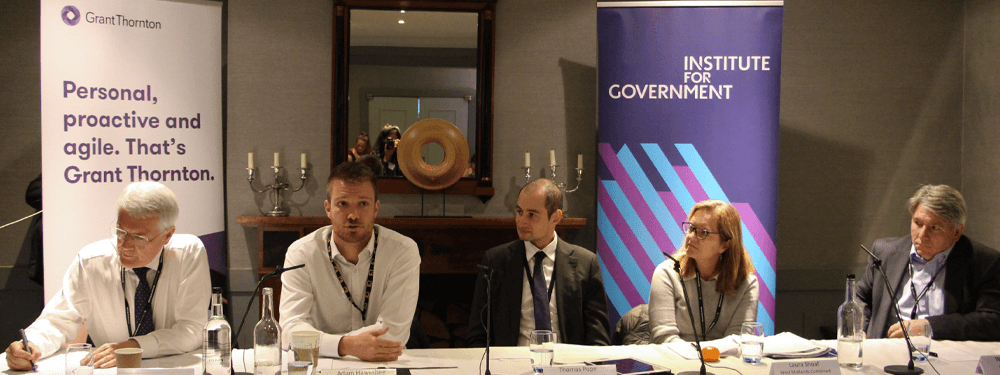The expert panel consisted of:
- Andrew Jones MP, former Transport Minister and Chair of the Transport for the North APPG
- Adam Hawksbee, Head of Levelling Up, Onward
- Thomas Pope, Deputy Chief Economist at the Institute for Government
- Laura Shoaf, Chief Executive Officer, West Midlands Combined Authority and Chair, Urban Transport Group
- Will McWilliams, Partner, Head of Public Services Advisory, Grant Thornton UK LLP
They shared thoughts on key priorities for Government, including the importance of devolution and the delivery process. They then moved onto specifics about passenger patterns and other key considerations. It was agreed that strategic transport policy was necessary for promoting regional growth and levelling up.
Devolution is necessary
The panellists discussed how devolution presents challenges and opportunities. One challenge is that combined authorities don’t have all the powers to action new ideas. Laura Shoaf said that transport provision would always be important, and it was necessary to her region to decarbonize their network. They have big ambitions to deliver and raise money locally with devolved funding being key.
Adam Hawksbee said there are massive barriers to transport that are specific to local areas, such as skills, safety, and healthcare, which needed to be considered in tandem with transport. He asserted there cannot be a one-size-fits all solution across the country, which was why devolution is so important. Transport was one of a series of levers for levelling up, which could only be discerned and achieved on a local level, he concluded.
It was agreed that there is an opportunity for local decision-making when it comes to the delivery of transport solutions. Hawksbee suggested that the city region is the right scale to start, with funding needing to go to local authorities for them to invest accordingly. There are places in complete transport poverty which need to be recognised and prioritised, as Shoaf pointed out. It is also important to figure out how to leverage existing assets and technology.

Speed of delivery and efficiency are important
The delivery of strategic transport policy was another primary focus of the discussion. The speed of delivery and efficiency were considered key, along with taking a systems approach. It was noted by Andrew Jones that it takes incredibly long to debate infrastructure, noting the opportunity for revision is too prevalent. He did not wish to compromise anything, but said Government needed to be more efficient.
“Government is siloed across and within departments...I have been Minister for Bus, Rail, Road and Tram...but not often at the same time.”
Andrew Jones MP
Will McWilliams noted that revenue was being generated in different forms, and suggested the importance of looking at diverse sources such as loyalty schemes. He didn't believe Government was making progress fast enough, and he said that the speed of delivery needs to increase if they really want to make a difference in levelling up. The foremost challenge for infrastructure is the process of delivery, which is often too complicated. Productivity in construction also needs to be unlocked as it has been stagnant for decades.
Adapting to changing passenger patterns
In relation to passenger patterns, the discussion revealed that travel patterns have changed since pre-pandemic times. Although passenger numbers are not much different, times of travel have changed. This could provide opportunities for efficiency gains. While traditional commutes in London are down, affecting revenue, it is not clear if this is the case throughout the whole of the UK, another argument for considering local priorities and devolution.
Other key considerations
Spatial development, HS2 and public procurement were three further topics raised in the discussion. Regarding spatial development, there is a varied capacity at a local level to deliver. It is important for councils to innovate and be entrepreneurial in their approach. On HS2, there is uncertainty about whether it will be delivered, even though it is considered a key project. As for public procurement, it is necessary to invest in this for the future, along with industrial strategy. Suppliers should be held to account to see the retained in-country benefit. The economic impact of transport policy, such as job creation as well as the role of the private sector, should also be taken into account.
Listen on demand to the full exchange from the session.
You can also read our analysis of the levelling up agenda in Levelling up: agreeing and delivering on priorities.
![]()






